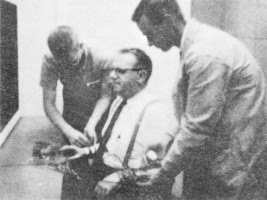
Stanley Milgram conducted a social psychology experiment about obedience to authority. The experiment aptly came to be known as the "Milgram Experiment." It began as in inquiry into conformity, but turned into much more.
Milgram wondered what would happen if he had participants administer what they thought was a real electric shock to an actor (confederate) pretending to be shocked and be in excrutiating pain. The actor had to answer questions, when right nothing would happen, but when wrong he would be shocked. With each wrong answer the shock would get worse. The participants started by delivering 15-volt shocks. The fake voltage eventually increased to a maximum of 450 volts.
If the participant expressed any reservations about shocking another human being and causing them pain the session was abruptly ended. The actor screamed louder with each new shock, pleaded with the participant to stop and even said he had a heart condition and felt like he was dying.
Amazingly enough, 62.5% of participants delivered the maximum shock possible. People felt pressure from the psychologist in the room with them, as well as a sense of duty to their role, to finish the experiment despite causing potentially serious harm to another human being.
Would the results be different had participants been responding through social media rather than face-to-face contact?
I truly believe that had the participant been deciding to administer a shock or not through social media that percentage of 62.5% would be significantly lower. Social media channels give individuals a stronger sense of authority and less pressure to remain obedient to a situation or role. There is certainly still a sense of groupthink, riot mentality and all the other scary social phenomenons, but people feel more empowered to share their true opinions with the shield of social media.
What do you think?






0 comments:
Post a Comment